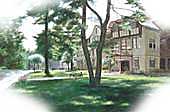Summer
1995
How to Read The Word
John W Follette
One day while reading the Word, the Lord spoke to me. I know
how His voice sounds. It is not a real voice, but something
inside that has tones and inflections. He said quietly to
me, "How are you reading?" I thought, I am reading
like I always do. I read, hoping that you will speak to me
through it.
The Lord would not have asked this question unless He was
willing to tell me. So I said, "Lord, how should I read?"
In response, I was told there are three methods of reading
the Word of God.
The first is a "perfunctory" reading in which we
feel a certain obligation to read. This will not take us very
far in spiritual things as we read, because we feel this is
what we should do. There is little that the Lord can work
into our spirits with this attitude.
There are "marathon" readers who read several chapters
each day. I have asked these, "What did you receive?"
They usually respond, "Not much, I just read the Bible."
I tell them that they should read something else, as reading
the Word this way will damage their spirit.
It is right to have a system about our reading. If the Lord
is leading us to read certain portions or books, we are to
stay there until the Lord is finished with us. Then we can
begin with another portion that He lays upon our heart.
The second is a "traditional" pattern. Because
we have read the Word many times and are familiar with its
content, we have a conception of what comes next, and of other
portions that add to it. For example, when we read a parable
in Luke, we say "Matthew adds such and such to this."
We are becoming very conscious of the letter of the Word and
its position. This is good, but it does not feed our spirit.
When we read traditionally, we are reading with an anticipation,
knowing what to expect next in the Word.
When the Lord stopped me, I was reading the story of the
household of Mary, Martha, and Lazarus. I was reading along,
waiting for Jesus to say, "Lazarus, come forth."
I was leaving unnoticed many wonderful bits of truth that
are hidden in their conversations; in the ways they relate
to each other, or their approach to Jesus.
The Scriptures are designed and arranged to reveal spiritual
principles to us. Once I began to see this, I spent weeks
in this one chapter. I forgot all about Lazarus coming forth
from the tomb.
People read traditionally because they receive a certain
reaction from their reading. Originally it gave them a lift,
so they seek that lift again. Also, there are book marks,
or tracts that point to Scriptures that relate to certain
problems, or areas of need. This is mechanical and may be
of some help, but we are being robbed of the rich truths the
Lord intends us to have, which are hidden within these passages.
The Lord said, "you are not to read that way. If you
do, I will be unable to meet you in the Word, as you have
closed the door for Me to come with something fresh."
I responded, "Lord, you have shown me two ways not to
read, now how should I read?" He said, "Never approach
the Word like any other literature." This means we must
take a different attitude than merely reading the Word because
we should, or because it is interesting. We must keep our
heart open and allow the Holy Spirit to speak to us. As we
do, He will show us many things from a particular passage,
which once we merely read through.
An example is Luke 5:1-11, which covers much of our experience
in spiritual living. These records are there to teach us spiritual
principles.
"And it came to pass, that, as the people
pressed upon Him to hear the Word of God,
He stood by the lake of Gennesaret" Luke 5:1.
Notice that they desired to hear the Word. This is the motivation
which opened His heart to them.
There was another group that came to Him. They were hungry,
so He satisfied their physical need because He knew they would
be unable to hear the Word, due to their stomachs.
While they were still eating the multiplied bread and fish,
Jesus discerned something that closed His heart to them.
"When Jesus therefore perceived that they would
come and take Him by force, to make Him a king,
He departed again into a mountain himself
alone" John 6:15.
They were eating a miracle, but in their hearts they were
hoping to divert this lovely expression of God and make Him
a king so they could continue to receive. Therefore, He left
them and went alone into the mountains.
Finally, Jesus returned and rebuked them. He told them that
their only interest was the loaves and fishes. When He offered
them what they really needed, His flesh and blood, they scorned
Him and left.
In these Scriptures, two different fields of motivation are
shown. In the one group, there was a hunger for the Word which
caused Him to sit down and teach them. The motivation of the
other group was a natural need which rested in the realm of
the flesh, and closed all spiritual avenues.
"And saw two ships standing by the lake: but
the fishermen were gone out of them, and were
washing their nets" Luke 5:2.
I read this many times before the Lord showed me that they
were cleansing the method by which they fulfilled their calling.
Think of some of the methods that we use to catch "fish,"
which should be cleansed.
"And He entered into one of the ships which
was Simons and prayed him that he would thrust
out a little from the land" Luke 5:3a.
This is the first of two commands that were given to Peter.
The first was, "thrust out a little from the land."
After the speaking is done, He gave another command, "launch
out into the deep."
These relate to the distances they are to push out. The Lord
does not send us to the deep at first as we would flounder
and drown. An inexperienced Christian would be unable to face
the waves, trials, and testings of the deep and would be swamped.
This "push out a little from the land" speaks of
the beginnings of a life of detachment. We have always lived
on the shore, but He desires to push us out into the realm
of the spirit. So He sat down and taught them out of the ship
in preparation for something greater.
The Lord must first bring us under the impact of spiritual
truth before we can be pushed out into that which He desires
for us. After He teaches, there will be a test. Thus, He will
give another command. "Launch out into the deep and let
down your nets."
All this did not come to me in a minute, but I have found
a new way to read the Word. The Lord desires to lead us into
the riches of the deep, as we continue to let our nets down
into the depths of His Word.


